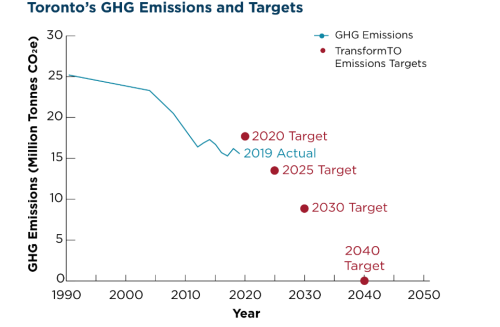
Fighting climate change and building resilience is one of the four Strategic Priorities of the City. The TransformTO Net Zero Strategy (TTO NZS) is the City’s climate action strategy to reach net zero greenhouse gas (GHG) emissions by 2040 and was adopted by City Council in December 2021. It includes a set of low-carbon goals and short-term actions to reduce Toronto’s GHG emissions while improving health, encouraging economic growth, improving social equity and increasing climate resilience.
The electrification of Toronto homes and buildings is an additional component of TTO NZS. In July 2022, Toronto City Council directed the development of a Memorandum of Understanding (MOU) between the City and Toronto Hydro that would help align key climate goals and activities between the two entities (EX34.9). This MOU will be presented to Council in 2023.
The TTO NZS identifies interim actions and targets in key GHG-emitting sectors – buildings, transportation and waste. Achieving these requires:
Implementation is underway related to electric vehicles, building performance, active transportation, waste diversion, local renewable energy, climate-informed decision making and public engagement. Technical modelling estimates that the full investment required by the City, businesses, other levels of government and residents is $145 billion over the next thirty years. Early action is anticipated to provide savings that would reduce the net impact to $57 billion community-wide.
The City will use its influence to regulate, advocate and facilitate transformation in five priority areas:
In July 2017, the TransformTO climate action strategy was unanimously approved by City Council. On October 2, 2019, City Council voted unanimously to declare a climate emergency and accelerated its previous 2050 net zero emissions reduction target by 10 years, to 2040. Toronto’s net zero commitment is one of the most ambitious in North America.
With the adoption of the TTO NZS, the City’s GHG reduction targets, from 1990 levels, are:
GHG emissions in Toronto were 38 per cent lower in 2019 than in 1990, which means that Toronto is on track to meet its 2020 GHG reduction target of 30 percent. Reductions since 1990 are the result of provincial coal fired power plant phase out, increased energy efficiencies and more fuel-efficient vehicles. Details about emissions sources and progress towards targets can be found here: Toronto’s 2019 greenhouse gas (GHG) inventory.
Details about emissions sources and progress towards targets can be found at Toronto’s 2019 greenhouse gas (GHG) inventory and the Toronto Atmospheric Fund 2021 GTHA Carbon Emissions Inventory

The TTO NZS will ensure the voices of First Nations, Inuit and Métis people are represented throughout implementation. An Indigenous Research Associate was hired during the Net Zero Strategy development to define key linkages between the TTO NZS and the City’s Reconciliation Action Plan. Key questions being reflected upon are “are we good ancestors?”, and “how are we honouring the land, water, and all our relations?”
The TransformTO Net Zero Strategy short-term implementation plan is aligned with the Reconciliation Action Plan. The plan includes actions related to engagement, inclusion in decision-making, supporting Indigenous-led climate action, and participating in Indigenous placemaking initiatives.
The TTO NZS is accompanied by a Council-adopted Net Zero Strategy Accountability and Management Framework. The framework was designed to include the voices of Indigenous communities, youth and equity-deserving communities while moving toward the Net Zero Strategy’s GHG reduction targets. Issues of affordability and service accessibility are key considerations as the City develops policies and programs to reduce GHG emissions.
A Climate Advisory Group (CAG), made up of diverse organizations and community members, will advise City staff on how climate equity issues affect Toronto’s communities and sectors, and how they can be addressed. All Climate Advisory Group members will receive training on climate equity and are expected to consider equity impacts in their advice.
James Nowlan
Executive Director, Environment & Climate Division
James.Nowlan@toronto.ca, 416-392-6064
Cecilia Fernandez
Manager Policy & Research, Environment & Climate Division
Cecilia.Fernandez@toronto.ca, 416-338-5469
Implementation of the TransformTO Net Zero Strategy is aligned with several existing City plans and strategies that also contribute to greenhouse gas reductions across a number of sectors, including:
Building Strategies and Plans
Transportation Strategies and Plans
Waste Strategies and Plans
Natural System Strategies and Plans